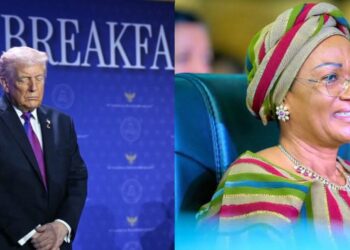From Miss World to Hollywood trailblazer, Priyanka Chopra Jonas embodies how beauty and ambition can become instruments of soft power. Her journey offers lessons for Africa’s rising creative industries.

As a Nigerian journalist whose professional journeys have taken me across Ghana, Kenya, South Africa, and other African countries, I have often reflected on the ways culture intersects with politics, identity, and global power. Entertainment is rarely just entertainment; it is a projection of values, a soft instrument of diplomacy, and a marker of who gets to be seen and celebrated on the world stage. Few figures embody this intersection as powerfully as Priyanka Chopra Jonas.
Watching her in Heads of State (2025), where she plays a senior MI6 agent alongside Idris Elba and John Cena, I was reminded that Chopra Jonas is not merely an actress. She is a cultural export whose significance extends far beyond cinema. Her career trajectory—from winning Miss World in 2000 to becoming a Hollywood mainstay and global humanitarian—mirrors larger shifts in how emerging nations like India project soft power through their talent, and how audiences worldwide are renegotiating whose stories deserve primacy.
The symbolism of her Miss World victory still lingers. A year later, in 2001, I watched with pride as she crowned her successor, Agbani Darego of Nigeria—the first Black African woman to win the title. That moment was more than pageantry: it was geopolitics dressed in sequins. For India, Chopra Jonas’ crown confirmed its growing cultural confidence. For Nigeria and Africa at large, Darego’s triumph symbolized entry into a global conversation long dominated by Western ideals of beauty. Their meeting on that stage represented a rare convergence of South-South visibility, reminding the world that cultural icons need not emerge exclusively from the West.
READ ALSO:Nigeria’s Interest Rate Slash: Growth Stimulus or Gamble?
Chopra Jonas’ career since then has been marked by deliberate transcendence of boundaries. In Bollywood, she built credibility through complex roles in Fashion and Mary Kom. In Hollywood, she shattered ceilings as the first South Asian woman to headline an American network drama with Quantico. Alongside, she has cultivated influence as a producer of regional Indian films and as a UNICEF Goodwill Ambassador. These roles reflect more than individual success—they reflect the rise of India as a cultural force and the expanding demand for representation in Western industries historically defined by exclusion.
Her visibility is instructive for Africa. While India has leveraged figures like Chopra Jonas to expand its global cultural footprint, Africa’s talent—though abundant—remains under-leveraged in shaping global narratives. Agbani Darego’s Miss World win was a breakthrough, yet Africa has struggled to sustain such symbolic victories into structural change. Chopra Jonas demonstrates what becomes possible when individual brilliance is supported by national ambition, industry infrastructure, and a willingness to blur the lines between art, diplomacy, and activism.
In this light, Chopra Jonas is not only an actress but also a case study in the geopolitics of stardom. She exemplifies how beauty, intellect, and resilience can be transformed into instruments of soft power, amplifying a nation’s voice in global affairs. She also underscores a lesson for regions like Africa: representation is not merely about moments of recognition but about building sustainable platforms that allow local talent to thrive internationally.
Nearly twenty-five years after her Miss World crown, Priyanka Chopra Jonas still commands relevance across continents. Her presence on screen and in advocacy reminds us that true global stardom is not just about personal fame—it is about becoming a vessel through which nations project their aspirations, values, and identities. For India, she is a symbol of cultural ascendancy. For Africa, she is a reminder of what is possible if talent is matched with structural support. For the world, she is proof that the center of cultural influence is no longer fixed in the West.
READ ALSO:Tiwa Savage Exposes Music’s Double Standards for Women
Looking ahead, Africa—and particularly Nigeria, with its booming film, fashion, and music industries—must learn from the Priyanka Chopra Jonas model. It is not enough to produce individual stars; what is needed is a deliberate investment in infrastructure, global partnerships, and narratives that travel beyond borders. Just as Chopra Jonas has become India’s cultural ambassador through both artistry and advocacy, Africa must nurture its icons into institutions, ensuring that our creative talent does not merely shine but reshapes the global stage for generations to come.
Ibrahim Taofeek Kegbegbe is a Nigerian journalist who has reported across Africa, with a focus on culture, politics, and the intersections of global influence.

















